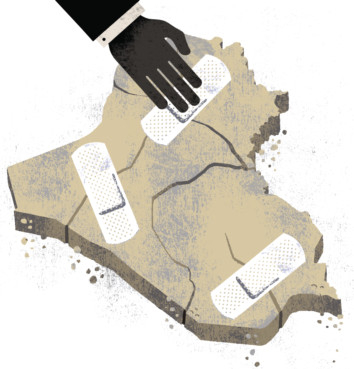
Despite its natural resources and human wealth, Iraq has been suffering since 2003 and is on the brink of bankruptcy. It also faces great difficulties as it tries to remedy its situation.
The flaw lies — undoubtedly — in the foundations upon which the political process was built; this foundation led to the rise of Daesh (the Islamic State of Iraq and the Levant).
So what are the chances for reform and for confronting and defeating this terrorist organisation, given the difficult conditions being experienced today?
Eliminating this organisation will have to be done through an international alliance, wherein the West, led by the United States, will play a leading role. The other roles will have to be played by regional alliances and this demands an improvement in Iraqi-Arab relations, so that Iraq’s Arab neighbours can stand in solidarity with the country to face the lethal group.
Iraq’s Prime Minister Haidar Al Abadi will find that he will have to take into consideration all that was overlooked and ignored by his predecessor, Nouri Al Maliki, during his eight-year rule. Al Abadi has to reconsider the fate of those who were marginalised, including his allies, because all these forces represent the key that will solve all other problems in Iraq.
For Iraq to remain united and intact, the leader has to be Iraqi in his affiliation, a unifier in his convictions, and a liberal in the way he carries out his duties and tasks.
So will Al Abadi and his overburdened government be able to face all these problems in this manner or does he have other options? Will he find real support and backing from the other forces in the Iraqi political process?
Al Abadi has no option other than the national one when it comes to facing Daesh. The decisions he took during the past 100 days in office reflect optimism. However, it is doubtful that he will find the necessary support and backing from others.
This is not speculation but a reading of the situation that seeks to explain the current political landscape in Iraq. Some events have a bigger impact than others on the political situation.
The first of these events was the Arbil conference that was held on December 18, last year, under the slogan “The Arab Conference for Combatting Terrorism”. The conference’s aim was to send a message to the international coalition leading the war against Daesh that Arabs are a united bloc with goals that do not conflict with the anti-terrorism policy. However, they do not participate in decision-making commensurate with their size.
The second event is the Kurdish military effort to defeat Daesh in some areas, in order to gain maximum political advantage through the annexation of the liberated areas to the Kurdish geographical region. And imposing it as a fait accompli, a fact that was admitted by the head of the Kurdish regional government, Nechirvan Barzani.
The third of these events was that some political elites again started demanding the creation of federal regions. They did it in a manner that suggested that their understanding of federalism was limited to the interests of their governorates.
Here, they are forgetting the fact that the federal project will not be complete without a comprehensive programme of clear and transparent understanding with the rest of the country; Iraq’s veins are intertwined in ways that are hard to ignore.
Disintegration is the most obvious phenomenon in Iraq. The efforts made to weaken the centre and the trend towards more decentralisation in favour of federal regions and provincial councils are the hallmarks of the political reality.
The talk about the establishment of the National Guard and broadening the base of the popular army (Al Hashd) and arming tribes in the western region is much louder than any talk about re-building the Iraqi army.
And the spectre of the regions and injustice faced by oil-rich cities, which is gaining momentum, is more prevalent than demands for rebuilding of the Iraqi state on a civilised foundation.
And talk about the role of religious leaders in building a new Iraq is louder than any talk about the role of thinkers and intellectuals in this respect. When looking at where these conversations are taking place, we find frustrating sights of a battle revolving around dividing the spoils. Those behind this entered the political arena with a racist, sectarian and tribal agenda.
Maintaining the ethno-sectarian-regional balance has become second nature in the country, and there is a political class that has succeeded in employing the politics of affiliation instead of political programmes as a method to rise and remain in top decision-making positions in government.
The circumstances in Iraq still allow forces to be grouped according to sectarian, ethnic or zonal basis and this will most certainly be an obstacle against facing Daesh effectively. This organisation will be defeated militarily, inevitably. However, its return one way or another is expected, as long as quota equations persist.
Mohammad Akef Jamal is an Iraqi writer based in Dubai.








